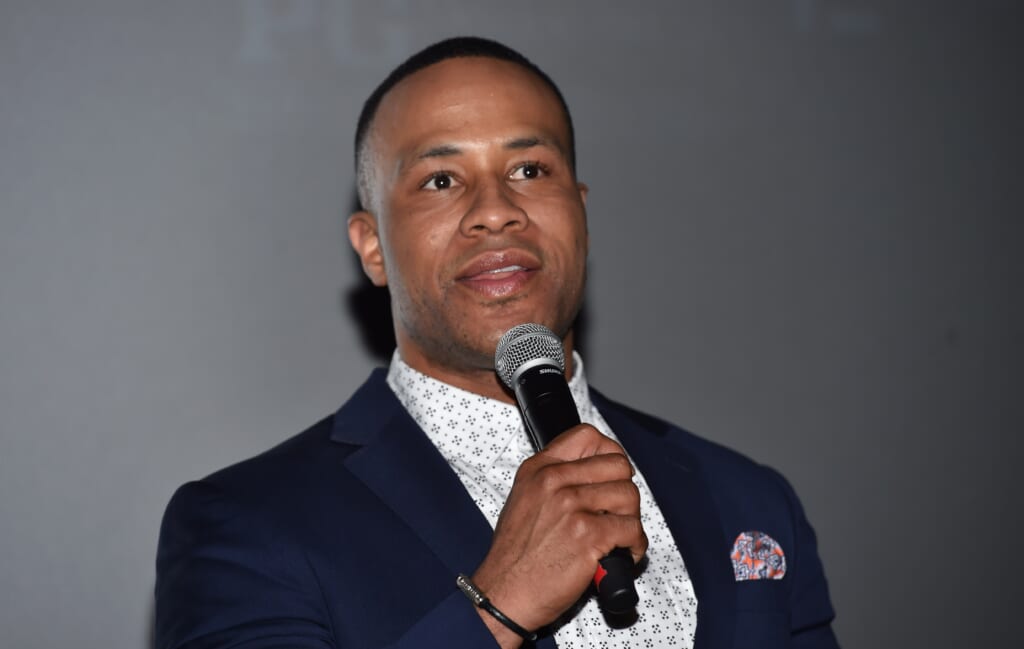DeVon Franklin talks Oscars diversity efforts: ‘There is not yet equity’
“Let's just acknowledge that we are not in a utopian business where everything is how we all want it to be. There's still prejudice we're working through," Franklin says.
As a governor at large for the Academy of Motion Pictures Arts and Sciences, DeVon Franklin has been at the forefront of the organization’s efforts to be more inclusive and equitable for creatives of color.
Six years after #OscarsSoWhite sparked a national conversation about the way the Oscars recognizes Black talent, the Academy remains committed to changing its rep. theGrio’s Entertainment Director Cortney Wills spoke to the longtime producer about the voting process, the changes being made, and this year’s nominees on this week’s episode of Acting Up.

The 93rd Oscars are going down this weekend and we can’t wait to see if any of our faves are able to take home the industry’s biggest awards. Viola Davis, Chadwick Boseman, Leslie Odom, Jr., and Andra Day are among the stars we’re rooting for in this relatively big year for Black talent.
When the nominations were announced, lots of people were surprised by the fact that Daniel Kaluuya and LaKeith Stanfield are both nominated for Best Supporting Actor for Judas and the Black Messiah.
Read More: The Lucas Brothers on dropping out of law school: ‘It was hell’
“It’s not a math equation. It’s a conversation,” he says of the voting process that has some people puzzled about who the star of the film actually is.
“They both are, you know, totally because they both have stakes in the film. They both need each other to tell the story,” he says.

“But in terms of how this happens, it’s a conversation within the branch trying to do the best job they can do to really, you know, one, acknowledge the performance and then to try to contextualize what is the best category for that performance to be recognized in. And so, these things do happen…it’s not like, hey, check a box for supporting, check a box for lead. It really gets down into a conversation in that branch and the members of that branch made a decision that that was the best way to contextualize and honor their performances was through the supporting category.”
Franklin spoke about several initiatives and changes that have already been put in place but acknowledged that the work being done at the Academy and in Hollywood is far from over.
“I’ll be the first one to tell you that this business has a long way to go. When it comes to equity, when it comes to representation, when it comes to consideration… I’ve been in the business for 25 years, so I’ve seen a lot. And even with all the progress this business has made, when you note what you’re noting, it’s because there is not yet equity. There is not yet equity and consideration for this, for equitable contributions for people of color and artists of color. We’re not there yet. We are not there yet where it all means the same thing for everyone,” he says.
“Let’s just acknowledge that we are not in a utopian business where everything is how we all want it to be. There’s still prejudice we’re working through. There’s still unconscious bias that we’re working through. There’s still sometimes this idea that one is more valuable than the other. And every single day we have to continue to fight against that notion because it’s not true.”
While discussing the fact that Black actors don’t seem to benefit from Oscar wins in the same ways that their white counterparts do, Franklin noted that perseverance is key to moving the needle.

“I personally believe that the awards are nice as a recognition of what is done, but I also believe that we have to keep moving forward anyhow. You know, like and I do agree with you when you look at the impact of some of the awards I’ve had and people of color winning awards and not having the same bump,” he continues.
“What I love about what you say about an Octavia [Spencer] or a Halle [Barry] or a Viola [Davis] is that they get up and they keep going and they work and they give us they keep giving more of themselves to us, you know? And that to me is such a powerful testament to who they are that even in the face of these facts that you are laying out, it doesn’t stop them from showing up and still giving us, the people, more of them; more of their art; more of their heart. But I do agree that we as a business have a long way to go.”
Read More: What to expect at the 2021 Oscars ceremony
As we continue to hold Hollywood accountable, it’s clear that the Academy is continuing to work toward real change by leaning on the guidance of Franklin and others who have actually navigated the industry themselves.
“I’m a Black producer. I can tell you every day the fights that I got to fight as a Black producer and as someone who’s been around for a long time and has a track record of success. There are still things that I have to fight and I just do my best not to get bitter about it, not to get frustrated and say, OK, you know what, this is the way it is. But I’m committed to not allowing this to be the way it will always be,” he explains.
“That’s why I serve as a governor. I do this work. I try to make a contribution because I do want to live in an industry where everyone is treated equally and gets an equal bump for their work, consideration for their work, and acknowledgment that goes along with that.”
Check out the full conversation on this week’s episode of Acting Up wherever you listen to your podcasts.
Have you subscribed to theGrio’s podcast “Dear Culture”? Download our newest episodes now!
TheGrio is now on Apple TV, Amazon Fire, and Roku. Download theGrio today!
More About:Entertainment Acting Up Film Podcast

